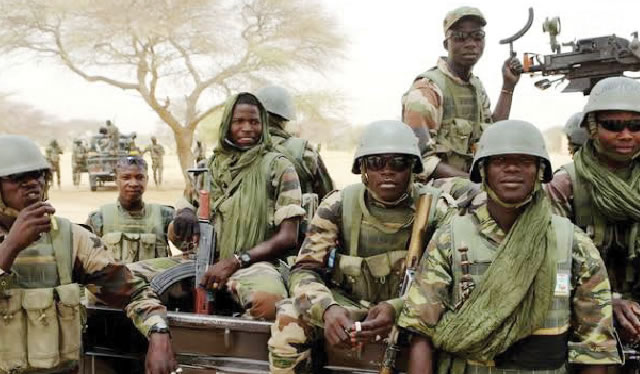By Peter Omopo
Families of Nigerian soldiers killed in recent battles against insurgents in the North-East have called on the Federal Government to urgently address the escalating insecurity, lamenting the persistent loss of lives and what they describe as the government’s inadequate support for bereaved military families.
Their pleas come in the aftermath of a deadly attack on a Forward Operating Base in Marte, Borno State, on Monday, which claimed the lives of at least five soldiers. According to military sources, insurgents overran the base, looted weapons, and fled with military vehicles. The Defence Headquarters, however, said the attack was repelled after a fierce gun battle, with many terrorists killed.
The Director of Defence Media Operations, Maj. Gen. Markus Kangye, confirmed the attack in a statement, saying troops had successfully defended the base, though details on troop casualties remain undisclosed.
Since the start of 2025, there has been a series of violent assaults on military formations in Borno and Yobe states, attributed to Boko Haram and Islamic State West Africa Province (ISWAP). At least 20 soldiers, including a Commanding Officer, were killed in Malam Fatori in January. Other deadly attacks have occurred in Gwoza, Damboa, and Buni Gari.
In separate interviews with Saturday PUNCH, relatives of slain soldiers expressed heartbreak over the deaths and frustration over the conditions under which the troops served.
A widow in Benue State, whose husband died in Borno three months ago, said the military warned her against speaking to the media but could no longer remain silent. She described the hardship her family faces and criticised the lack of adequate weapons, shelter, and welfare for soldiers.
“Because of what my husband went through, I will not encourage anyone close to me to join the military again. They lacked proper weapons, food, and even decent accommodation. The government is sacrificing our loved ones,” she said.
The widow, who has three children, revealed that her husband’s entitlements had yet to be paid, forcing the family to rely on support from friends and relatives.
Similarly, Shamsudeen Abdullahi from Gombe State recounted how his 30-year-old brother, Kamaludeen, was killed by Boko Haram in Gwoza on May 7. He said Kamaludeen had recently married and was expecting a child when he died.
“He supported the entire family. Our mother received N20,000 from his salary monthly, and he helped others too. He requested a repost from Borno but was denied. A week after replacing a fallen officer, he was also killed,” Shamsudeen said.
He urged the government to act decisively to end the insurgency and protect military personnel.
Several widows also condemned what they described as abandonment by the government following the deaths of their spouses.
Military authorities have yet to provide official casualty figures for most of the attacks this year, but families continue to demand accountability, better welfare for troops, and compensation for the families of those who die in active service.

